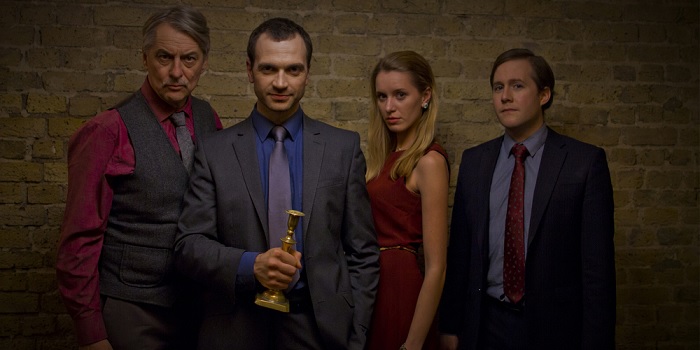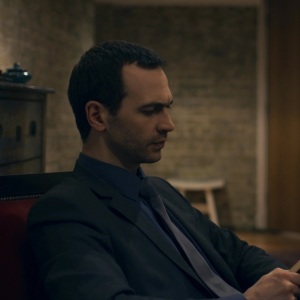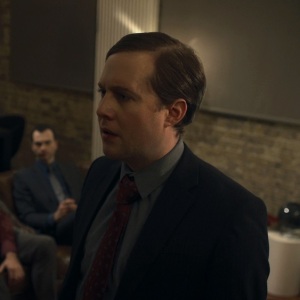
Candlestick (2014)
Cast: Andrew Fitch, Isla Ure, Nigel Thomas
Director: Christopher Presswell
Country: UK
Genre: Drama | Mystery | Thriller
Official Trailer: Here
Editor’s Note: The following dispatch is part of our coverage of the IndieCork film festival. For more information visit indiecork.com or follow IndieCork on Twitter. Candlestick is scheduled for US VOD release early next year.
“In most of the cases the crime only came to light slowly, as the result of careful investigations which started off with the suspicions of neighbours or relatives; and in nearly every case there was some dramatic coincidence, in which the finger of Providence could be clearly seen, or one of those episodes that no novelist would dare to make up…”
So says George Orwell in his 1946 essay “Decline of the English Murder”, a text invoked by IndieCork programmer Mick Hannigan as he introduced Christopher Presswell’s Candlestick, a film very much intent on constituting a resurrection. Not so much wearing its references on its sleeve as fashioning fancy cuffs it’s proud to flourish, the movie opens on a terrifically throwback Saul Bass-style sequence scored by the Prague Philharmonic with a dramatic dread to make Bernard Herrmann proud. One wonders what Orwell might have thought of the films Hitchcock made with both men in the years following that essay; with Presswell, one needn’t.
Presswell and co-writer Forgács W. András have crafted a juicy jaunt of a tale, devilishly entertaining for its forcible casting of its audience in the role of accessories before the fact.
 But if the stylistic cinematics of Candlestick owe much to the Hitchcock of the late ‘50s and early ‘60s, it’s an earlier movie to which the new film’s ultimately beholden: Rope. Rolling the homoerotic undertones of that 1950 masterpiece into a single central character in unashamed adoration of himself, Presswell and co-writer Forgács W. András have crafted a juicy jaunt of a tale, devilishly entertaining for its forcible casting of its audience in the role of accessories before the fact. That’s as much symptomatic of the wickedly fun script as it is of a decadent lead performance from Andrew Fitch, who relishes the Nietzschean novelty of his role, serving it with a side-dish of spiteful asides and sinister glares.
But if the stylistic cinematics of Candlestick owe much to the Hitchcock of the late ‘50s and early ‘60s, it’s an earlier movie to which the new film’s ultimately beholden: Rope. Rolling the homoerotic undertones of that 1950 masterpiece into a single central character in unashamed adoration of himself, Presswell and co-writer Forgács W. András have crafted a juicy jaunt of a tale, devilishly entertaining for its forcible casting of its audience in the role of accessories before the fact. That’s as much symptomatic of the wickedly fun script as it is of a decadent lead performance from Andrew Fitch, who relishes the Nietzschean novelty of his role, serving it with a side-dish of spiteful asides and sinister glares.
As Jack, whose hosting of a black tie game of Cluedo among friends is little but scene-setting subterfuge for an altogether more sinister purpose, Fitch best evidences the knowingly heightened style of the performances here. It’s not only for its clear tips-of-the-hat to Rope and Dial M for Murder that the movie might feel like a stage-to-screen adaptation; the theatrical candour of the cast and contained single setting of the story assert an assuredly stagey sensibility to proceedings. That’s apt of a film whose pretensions to plot complexity are less narrative playfulness at work than a clever commentary on constructed identity; if the joy of watching Candlestick is in enjoying the twists and turns, it’s the things they tell us about the way we present ourselves that make it a treat to think back on.
…for all the intermediary tensions that underline Candlestick, it is a film entirely at home amidst those it admires, cheekily touching on its own antiquity while updating the murder mystery to the modern age.
 Yet while the pseudo-stagecraft style of Presswell’s direction reaps benefits at times, it’s also a play on the proscenium that’s just a little too arch. For all the impression that’s made by DP Haider Zafar’s effective early establishment of space, Candlestick ironically emerges as if a less successful stage-screen translation than the actual adaptations it apes. That’s true too in a tendency to tell rather than show, and en route to his denouement it’s in the Psycho-style are-you-with-us-still storytelling that Presswell might seem most akin to Hitchcock. Still, that’s small worry with a denouement so fun: gasps and giggles are assured in equal measure as this troupe finally and fittingly delivers on the promise of their premise.
Yet while the pseudo-stagecraft style of Presswell’s direction reaps benefits at times, it’s also a play on the proscenium that’s just a little too arch. For all the impression that’s made by DP Haider Zafar’s effective early establishment of space, Candlestick ironically emerges as if a less successful stage-screen translation than the actual adaptations it apes. That’s true too in a tendency to tell rather than show, and en route to his denouement it’s in the Psycho-style are-you-with-us-still storytelling that Presswell might seem most akin to Hitchcock. Still, that’s small worry with a denouement so fun: gasps and giggles are assured in equal measure as this troupe finally and fittingly delivers on the promise of their premise.
Which isn’t to say that they don’t do so throughout: for all the intermediary tensions that underline Candlestick, it is a film entirely at home amidst those it admires, cheekily touching on its own antiquity while updating the murder mystery to the modern age. It’s a movie that’s magnificent fun, never more so than with the camera trained on Tom Knight, who relishes a role that plays like Rope’s Rupert Cadell by way of Withnail & I’s Uncle Monty. He feasts upon the scenery like a man starved, apt of the film’s own insatiable adoration of the genre it plays on. Like a Raymond Chandler “cannibalisation”, Candlestick may feed off the familiar, but it’s the sport with which it spits it back out that makes it feel so fresh.



